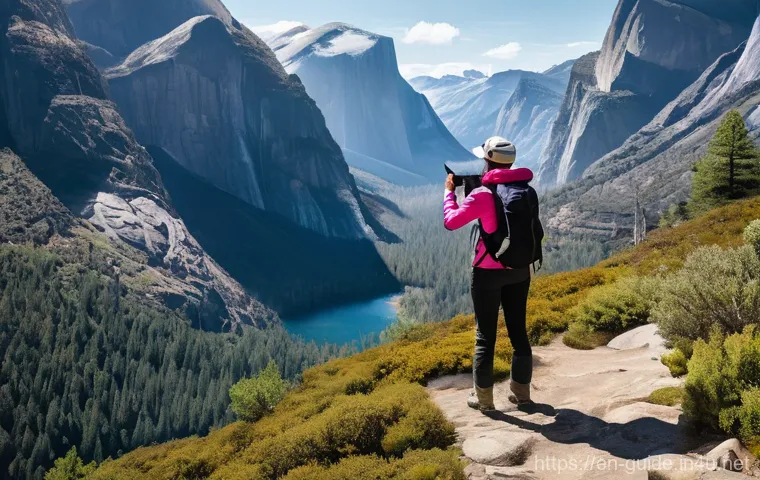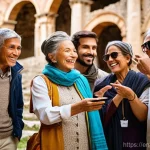Hey everyone! As someone who’s spent years navigating the incredible world of tourism, I know firsthand how competitive it can be, especially for a role as dynamic as a Tourist Interpreter Guide.
It’s not just about speaking multiple languages; it’s about weaving stories, connecting cultures, and creating unforgettable experiences for people from all walks of life.
I’ve personally seen resumes that shine and others that, well, just don’t capture that spark. Crafting a resume that truly reflects your unique blend of language mastery, cultural savvy, and guiding charisma can feel like an art form in itself, but it’s absolutely key to landing that dream job.
(Career.io mentions that an effective tour guide resume highlights organization, planning, storytelling, and problem-solving skills, and that you need to demonstrate how you think on your feet and communicate well).
From showcasing those essential soft skills like communication and problem-solving to highlighting your deep destination knowledge, every detail matters.
It’s all about making your application pop, proving you’re not just a guide but a genuine experience-maker. Are you ready to transform your resume from a simple document into a compelling narrative of your potential?
Let’s dive in and truly make your qualifications sing!Hey everyone! As someone who’s spent years navigating the incredible world of tourism, I know firsthand how competitive it can be, especially for a role as dynamic as a Tourist Interpreter Guide.
It’s not just about speaking multiple languages; it’s about weaving stories, connecting cultures, and creating unforgettable experiences for people from all walks of life.
I’ve personally seen resumes that shine and others that, well, just don’t capture that spark. Crafting a resume that truly reflects your unique blend of language mastery, cultural savvy, and guiding charisma can feel like an art form in itself, but it’s absolutely key to landing that dream job.
An effective tour guide resume should highlight organization, planning, storytelling, and problem-solving skills, showcasing your ability to think on your feet and communicate effectively.
From those essential soft skills like stellar communication and quick problem-solving, to your deep, nuanced destination knowledge, every single detail matters.
It’s all about making your application pop, proving you’re not just a guide but a genuine experience-maker who can truly captivate an audience. Are you ready to transform your resume from a simple document into a compelling narrative of your potential?
Let’s dive in and truly make your qualifications sing!
Crafting a Magnetic Summary: Your First Impression Matters

Okay, let’s be real: that top section of your resume, often called a summary or professional objective, is your grand entrance. It’s not just a formality; it’s your chance to grab attention immediately and make the hiring manager think, “Wow, this person gets it!” I’ve reviewed countless resumes in my time, and the ones that truly stand out are those with a summary that feels authentic and powerful, not just a list of buzzwords. Think of it as your elevator pitch, but in written form. You have precious seconds to convey your unique value proposition. Don’t just state you’re fluent in Spanish; tell them you’ve successfully led immersive historical tours for groups of 20+ English and Spanish-speaking visitors through Boston’s Freedom Trail, resulting in rave reviews and repeat bookings. That’s the kind of detail that makes a world of difference. It’s about painting a vivid picture of your capabilities and passion right from the start, making them excited to dive deeper into your qualifications. Trust me, a well-crafted summary can genuinely set the tone for your entire application and drastically improve your chances of getting that coveted interview.
Hooking Them from the Get-Go
When I’m looking at a resume, I’m not just scanning; I’m searching for that spark, that immediate connection. Your summary should practically scream, “I’m the guide you’ve been looking for!” It needs to be concise, impactful, and tailored to the specific role you’re applying for. Avoid generic phrases that could apply to anyone. Instead, use strong action verbs and highlight your most impressive achievements. Did you consistently receive 5-star ratings? Did you handle a particularly challenging situation with grace? Did you develop a unique tour route that became incredibly popular? These are the nuggets of gold that belong here. It’s about presenting yourself not just as a competent professional, but as an indispensable asset, someone who not only meets expectations but consistently exceeds them. This is where your personality can truly begin to shine through, even in a formal document, offering a glimpse into the engaging guide you truly are.
Quantifying Your Impact
Numbers speak volumes, and from my own experience, they’re incredibly persuasive. It’s one thing to say you’re an experienced guide; it’s another entirely to state that you’ve successfully led over 300 tours for international visitors, consistently achieving customer satisfaction scores of 95% or higher. See the difference? Quantifying your achievements gives them weight and credibility. Think about metrics like the number of tours you’ve conducted, the average group size you’ve managed, the percentage increase in positive feedback you’ve generated, or even the revenue you’ve helped bring in through extended tour options or merchandise sales. These aren’t just figures; they’re tangible proof of your effectiveness and your ability to deliver real results. Don’t be shy about showcasing your successes; this is your moment to brag a little, backed by solid data that supports your claims and makes your accomplishments undeniable to any discerning employer.
Showcasing Your Linguistic Prowess: More Than Just Fluency
For a Tourist Interpreter Guide, language skills are your bread and butter, but simply writing “fluent in X, Y, Z” on your resume just doesn’t cut it anymore. I’ve found that employers want to see how you *apply* those languages, not just that you know them. It’s about demonstrating real-world competence, the kind that comes from actually living and breathing the language, understanding its nuances, and being able to switch seamlessly between them while keeping your audience captivated. Are you capable of explaining complex historical facts in Mandarin as easily as you do in English? Can you crack a culturally appropriate joke in French? These are the experiences and capabilities that truly differentiate a good guide from an exceptional one. Employers are looking for proof that you can connect with diverse groups, not just translate words. This section is where you need to make your multilingual abilities truly sing, showcasing how they enhance the tour experience for everyone involved, reflecting your deep cultural immersion.
Beyond Simple “Fluent” Labels
Let’s be honest, everyone says “fluent.” But what does that really mean? From my perspective, it’s about providing context and examples. Instead of just listing “Spanish: Fluent,” consider adding details like “Spanish (Native Proficiency): Successfully conducted daily historical and cultural tours for Spanish-speaking groups from Mexico and Spain, including Q&A sessions and emergency assistance.” Or perhaps, “French (Advanced Professional Proficiency): Led private executive tours, interpreting complex business and cultural concepts for visiting French dignitaries.” If you have certifications, like DELE for Spanish or DELF/DALF for French, absolutely include those. Even better, mention if you’ve lived or worked extensively in a country where the language is spoken. These details paint a much richer picture than a single word ever could, demonstrating not just your linguistic capability but your lived experience with the language and its cultural context. It’s about showing, not just telling, your language mastery.
Real-World Application and Cultural Sensitivity
This is where you bring your language skills to life. It’s not just about grammar and vocabulary; it’s about understanding cultural idioms, humor, and sensitivities. I remember a time I was guiding a mixed group, and being able to smoothly transition between explaining a local tradition in English and then elaborating on a similar custom in German for part of the group, really made them feel seen and understood. Your resume should reflect this. Mention specific instances where your linguistic abilities facilitated a deeper cultural exchange, resolved a miscommunication, or enhanced a visitor’s appreciation of a site. Perhaps you’ve interpreted for local artisans, mediated conversations, or even helped visitors navigate local customs, like ordering food or understanding public transport. These examples highlight your practical application of language and your invaluable role as a cultural bridge, proving that you’re not just a speaker, but a true communicator who can truly connect with people on a deeper, more meaningful level.
Highlighting Your Guiding Experience: Beyond the Bullet Points
When it comes to your guiding experience, don’t just list job titles and dates. That’s the bare minimum, and honestly, it doesn’t tell me anything exciting. What I’m really looking for, and what I know hiring managers crave, are the stories behind those bullet points. I’ve personally seen resumes that transform a mundane list into a vibrant narrative of adventure and engagement. Did you lead groups through bustling city streets, ancient ruins, or serene national parks? What was unique about those tours? Did you have to adapt quickly to unexpected weather changes or last-minute itinerary shifts? These are the moments that truly showcase your skills and resilience. Think about the challenges you overcame, the memorable moments you created, and the positive feedback you received. This isn’t just about what you did; it’s about the impact you had and the experiences you facilitated. Your resume should read like a highlight reel of your career, painting a vivid picture of your capabilities and passion for guiding.
Telling Your Tour Stories
Every tour guide has incredible stories, and your resume is the place to share the condensed, professional versions of them. Instead of a generic “Led tours,” try something like, “Orchestrated engaging 4-hour walking tours of historic Philadelphia, captivating groups of up to 25 with immersive storytelling and interactive historical anecdotes, consistently receiving top-tier guest feedback.” Or perhaps, “Successfully managed logistical complexities for multi-day tours across the Scottish Highlands, coordinating transportation, accommodation, and diverse activity schedules for international clients.” These descriptions go beyond simple tasks; they convey responsibility, problem-solving, and the ability to create memorable experiences. I’ve found that candidates who can articulate the *impact* of their work, not just the duties, are the ones who truly resonate with potential employers. It shows you understand the value you bring to the table and how your guiding genuinely makes a difference to visitors.
Specialized Tour Narratives
Do you have a niche? Did you specialize in food tours, art history tours, adventure tours, or perhaps even ghost tours? This is prime real estate for your resume! Don’t just mention it in passing; elaborate on it. “Developed and led highly popular culinary walking tours through New Orleans’ French Quarter, introducing guests to local delicacies and the city’s rich gastronomic history, resulting in a 20% increase in repeat bookings.” Or maybe, “Curated and guided bespoke art gallery tours in London, providing expert commentary on contemporary art movements and engaging visitors in dynamic discussions.” Specialization demonstrates not only your expertise but also your passion and commitment to a particular area, making you a more attractive candidate for roles that require specific knowledge. From my own experiences, these specialized narratives often spark the most interesting conversations during interviews, proving that they are worth every character on your application.
Emphasizing Cultural Nuance and Local Expertise
Being a guide is so much more than pointing out landmarks and reciting facts. What truly separates a good guide from an extraordinary one is the ability to bridge cultural gaps and offer genuine local insights. I’ve seen guides who can just list dates, and then I’ve seen guides who can explain *why* those dates matter, how they shaped the local culture, and what hidden gems only a local would know. Your resume needs to convey this depth. It’s about demonstrating that you understand the soul of a place, not just its geography. Have you navigated sensitive cultural situations? Do you know the best local spot for an authentic, off-the-beaten-path meal that only a true local would recommend? These are the details that show you’re not just a tour operator, but a cultural ambassador. Employers want guides who can make visitors feel truly connected to their destination, not just transported through it. This level of understanding and connection is invaluable, and it’s something I always look for when assessing a potential guide.
Deep Dive into Destination Knowledge
Think about how you’ve gone beyond the standard tourist script. Have you spent years researching a particular historical period or a specific artistic movement relevant to your area? “Possess in-depth knowledge of ancient Roman history and archaeology, cultivated through extensive personal research and participation in local archaeological digs, enabling highly nuanced interpretations of historical sites for visitors.” Or perhaps, “Expert in Boston’s Revolutionary War history, capable of contextualizing key events within broader American narratives and engaging visitors with lesser-known anecdotes and personal stories.” This kind of detailed expertise demonstrates not just memory, but a genuine passion for the subject matter and a commitment to providing a richer, more authentic experience for your guests. It’s about showcasing your intellectual curiosity and how it translates into a more profound and memorable tour for your clients.
Bridging Cultural Gaps
This skill is absolutely paramount for an interpreter guide. It’s about understanding unspoken cues, social norms, and the nuances of international communication. Have you ever successfully diffused a misunderstanding between a local vendor and a tourist? “Mediated cultural differences to ensure seamless interactions between international guests and local communities, fostering mutual respect and enhancing positive visitor experiences.” Or maybe, “Provided insightful cultural context for Japanese visitors navigating American dining etiquette, ensuring comfort and enjoyment during culinary excursions.” These specific examples show you’re not just translating words, but interpreting entire cultural frameworks. It highlights your empathy, your cross-cultural communication skills, and your ability to make everyone feel comfortable and respected, regardless of their background. From my own adventures, these are the moments that truly make a guide indispensable, turning potential awkwardness into genuine understanding and connection.
The Art of Soft Skills: What Truly Sets You Apart
When I’m talking about soft skills, I’m not just talking about being ‘friendly.’ I mean those intangible yet incredibly powerful abilities that make a tour memorable and enjoyable, even when things don’t go perfectly. We’ve all been on tours where the guide was knowledgeable but lacked charisma, right? Or, conversely, incredibly charming but a bit lost on the facts. The sweet spot is someone who embodies both, and often, it’s the soft skills that shine brightest. This includes everything from your ability to command a group’s attention with a compelling story to your knack for resolving a sticky situation with a smile. It’s about emotional intelligence, adaptability, and an unwavering positive attitude, even when faced with unexpected challenges. These aren’t skills you learn from a textbook; they’re honed through experience, through countless interactions, and through a genuine love for what you do. They’re what transform a mere itinerary into an unforgettable journey, and they absolutely belong front and center on your resume.
Communication and Storytelling Magic
As a guide, you’re essentially a storyteller, and your resume needs to convey that. Don’t just list “excellent communication skills.” Instead, illustrate how you *use* those skills. “Engaged diverse groups of up to 30 visitors with compelling narratives and interactive presentations, adapting content to suit various age groups and interests.” Or, “Mastered the art of historical storytelling, bringing iconic figures and events to life through vivid descriptions and personal anecdotes, fostering deep visitor engagement.” Think about moments where you captivated an audience, explained a complex topic simply, or used humor effectively. These are the details that showcase your ability to connect with people on an emotional level, making them feel part of the narrative rather than just passive listeners. I’ve personally found that the guides who can weave a captivating tale are the ones guests remember long after the tour ends, and that’s exactly what employers are seeking.
Problem-Solving on the Go

Let’s be real: tours rarely go 100% according to plan. There’s always a curveball—a sudden downpour, a missed bus, a guest with a dietary restriction, or even an unexpected attraction closure. Your ability to think on your feet and calmly navigate these situations is invaluable. “Expertly managed unexpected itinerary changes due to adverse weather, swiftly improvising alternative routes and activities to maintain high guest satisfaction.” Or, “Resolved complex logistical challenges, including misplaced luggage and last-minute booking errors, ensuring minimal disruption to the tour experience and retaining positive client relationships.” These examples demonstrate your resourcefulness, your ability to remain calm under pressure, and your commitment to ensuring a smooth and enjoyable experience for your guests, no matter what surprises the day brings. It’s these real-world scenarios that truly highlight your professional competence and adaptability.
Tailoring Your Resume for Specific Destinations or Niches
One of the biggest mistakes I’ve seen people make on their resumes is sending out a generic document to every single job opening. As someone deeply embedded in the tourism world, I can tell you firsthand that a tailored resume isn’t just a good idea; it’s absolutely essential. Every destination has its own unique charm, history, and target demographic, and every tour company has its own specific culture and focus. What works for a luxury historical tour guide in Rome might not resonate with an adventure trekking guide in Patagonia, even if both require excellent language skills. You need to demonstrate that you understand the specific needs of the role and the unique selling points of the destination or niche. This isn’t about fabricating experience; it’s about strategically highlighting the experiences, skills, and knowledge you already possess that are most relevant to *that particular* job. It shows initiative, attention to detail, and a genuine interest in the specific opportunity, making you a much more compelling candidate.
Researching Your Target Role
Before you even begin writing, take the time to really dig into the job description and the company’s website. What are their values? What kind of tours do they offer? What keywords do they use? For example, if a job description for a wine tour guide in Napa Valley repeatedly mentions “viticulture” and “gastronomy,” then your resume should absolutely reflect your knowledge in those areas, even if you’ve primarily focused on historical tours before. You can emphasize how your communication skills apply to explaining complex processes like wine-making, or how your customer service background translates to creating a luxurious tasting experience. From my perspective, this research isn’t just about keywords; it’s about understanding the company’s ethos and aligning your personal brand with theirs. It tells them you’re not just looking for *a* job, but *this* job, specifically, and that makes a huge difference.
Customizing for Impact
Once you’ve done your research, it’s time to actively customize. This might mean rearranging sections, adding specific achievements, or even tweaking your summary to directly address the company’s needs. If the role emphasizes eco-tourism, highlight any experience you have with sustainable practices or leading nature-based tours. If it’s a high-end luxury tour operator, focus on your experience with VIP clients, attention to detail, and impeccable service. Perhaps you have a specific certification that’s highly valued in that niche, like wilderness first aid for adventure guides, or a sommelier certification for culinary tours. Don’t be afraid to make your resume a living document, adapting it for each application. This level of personalization doesn’t go unnoticed; it sends a clear message that you are thoughtful, dedicated, and truly invested in the opportunity, which is something I’ve always admired in successful candidates.
Making Technology Your Ally: Digital Tools and Platforms
In today’s fast-paced world, being a tourist interpreter guide isn’t just about having a great personality and knowing your history. Technology plays a massive role, and honestly, if your resume doesn’t reflect your comfort with digital tools, you’re missing a trick. I’ve personally seen how a guide’s ability to seamlessly integrate tech can elevate an entire tour experience. Think about using translation apps on the fly, managing group logistics with a mapping application, or even enhancing a historical narrative with augmented reality tools. It’s about leveraging these resources to make the tour smoother, more informative, and more engaging for your visitors. Your ability to embrace and utilize technology effectively demonstrates not just your modern approach, but also your efficiency and adaptability, qualities that are highly sought after in any dynamic role. This section is where you can show that you’re not just ready for the present, but also for the future of tourism, making you a truly well-rounded and indispensable guide.
Leveraging Digital Tour Aids
Modern guides often use a suite of digital tools to enhance their tours. Don’t just assume employers know you’re tech-savvy; explicitly state it. Have you used specific GPS navigation apps to manage complex routes? “Proficient in Google Maps and Waze for real-time navigation and itinerary adjustments, ensuring efficient tour progression.” Do you use presentation software or tablets to display historical images or video clips during your tours? “Utilized tablet-based multimedia presentations (e.g., PowerPoint, Keynote) to visually enhance historical narratives and provide supplementary information to diverse groups.” Even managing digital tickets or coordinating with online booking platforms are valuable skills. These details illustrate your practical competence with essential tools that streamline operations and enrich the visitor experience. It shows you’re not stuck in the past, but actively embracing the innovations that make guiding more effective and enjoyable for everyone.
Social Media Savvy
In our connected world, a guide’s influence can extend far beyond the tour itself. Many tour companies, from what I’ve observed, appreciate guides who understand the power of social media. Have you ever encouraged guests to share their experiences online? Have you contributed to a company’s social media presence? “Engaged with guests on social media platforms (e.g., Instagram, Facebook) to facilitate pre- and post-tour interactions and encourage positive online reviews.” Or, “Contributed high-quality photographic content and engaging captions for company’s Instagram account, boosting online visibility and client engagement.” This isn’t just about personal branding; it’s about understanding how to leverage digital platforms to amplify the tour experience and promote the company. It demonstrates a holistic understanding of modern tourism marketing and how a guide can play a vital role in its digital footprint, making you a more valuable asset in the long run.
Here’s a quick overview of key skills to consider including:
| Skill Category | Examples to Include | Why It Matters |
|---|---|---|
| Language Proficiency | Fluent in Spanish, French, German; Certified DELE C1; Experience interpreting for diverse groups. | Directly impacts communication with international guests and demonstrates cultural acumen. |
| Guiding Experience | Led 500+ city walking tours; Managed logistics for multi-day historical expeditions; Specialized in culinary tours. | Shows practical experience, leadership, and ability to manage complex operations. |
| Cultural Awareness | Facilitated cross-cultural communication; Expertise in local customs and etiquette; Adapted tours for various national backgrounds. | Essential for creating inclusive and respectful experiences for all visitors. |
| Communication | Engaging storytelling; Public speaking; Active listening; Clear articulation. | Captivates audiences, conveys information effectively, and builds rapport. |
| Problem-Solving | Crisis management; Adaptability to unforeseen circumstances; Conflict resolution. | Ensures smooth tour operations and maintains guest satisfaction even when challenges arise. |
| Technological Skills | Proficient in GPS navigation apps; Used multimedia for presentations; Familiar with online booking systems. | Demonstrates efficiency, modern approach, and ability to enhance tour delivery with digital tools. |
Proofreading with a Purpose: The Final Polish
Honestly, you could have the most incredible experience and stellar skills, but a resume riddled with typos or grammatical errors is like serving a five-star meal on a dirty plate. It instantly undermines your professionalism and attention to detail. I’ve cringed more times than I can count over otherwise strong candidates who submitted applications with glaring mistakes. It just signals a lack of care, and in a role where attention to detail is paramount – like making sure your tour group isn’t accidentally left behind, or that you’re accurately conveying historical facts – that’s a red flag. This final step isn’t just about correcting errors; it’s about making sure your resume shines, presenting you as the meticulous, reliable, and professional guide you truly are. Trust me, dedicating time to this final polish can significantly impact how your application is perceived and can be the deciding factor in securing an interview, making all your hard work truly pay off in the end.
Catching Those Sneaky Errors
It’s incredibly easy to overlook your own mistakes, especially when you’ve read something a dozen times. That’s why I always recommend a multi-pronged approach. First, read your resume aloud. You’d be amazed at how many awkward phrases or grammatical errors jump out at you when you hear them. Second, get a fresh pair of eyes on it. Ask a friend, a mentor, or a former colleague to review it for you. They’ll spot things you missed, guaranteed. Third, use online grammar and spell-checking tools, but don’t rely solely on them; they often miss context-specific errors. Pay particular attention to consistent formatting, dates, and names of places and languages. A single misplaced comma or an incorrect verb tense can detract from your credibility. This meticulous review process ensures that every word on your resume works *for* you, not against you, reinforcing your image as a detail-oriented and precise professional who leaves nothing to chance.
Ensuring Brand Consistency
Beyond just correcting errors, this final review is also about ensuring your “personal brand” is consistent throughout the document. Does the tone match the type of guide you are – enthusiastic, knowledgeable, calm, adventurous? Is there a clear, consistent narrative running through your experiences? Are your most impressive achievements highlighted effectively and consistently? For example, if you claim to be an expert in sustainable tourism, make sure your experience section reflects concrete actions you’ve taken in that area. It’s about ensuring that your resume tells a cohesive and compelling story about who you are as a professional. I’ve found that when a resume feels polished and consistent, it creates a much stronger and more trustworthy impression, making the hiring manager feel like they already have a good sense of who you are and the exceptional value you can bring to their team, which is exactly the feeling you want to evoke.
Wrapping Things Up, My Fellow Wanderers!
Well, we’ve journeyed through the ins and outs of crafting a resume that truly reflects your incredible potential as a Tourist Interpreter Guide. My hope is that you’re leaving here today feeling inspired and empowered to transform your application into a vibrant narrative, one that truly captures the magic you bring to every tour. Remember, it’s not just about listing qualifications; it’s about weaving a story of experience, passion, and genuine connection. I’ve seen firsthand how a resume that leaps off the page can open doors you never thought possible, turning those “maybe” piles into enthusiastic “yes!” responses. So, go forth, infuse your personality, quantify your successes, and let your unique light shine through. The world is waiting to hear your stories, and your resume is the perfect prologue!
Useful Information to Know
1. Networking is Your Secret Weapon: Don’t underestimate the power of connecting with other guides, local tourism boards, and hospitality professionals. Attend industry events, join online forums, and even strike up conversations with colleagues during tours. I’ve gotten some of my best opportunities and learned invaluable tips just by being open and engaging with the community. These connections often lead to word-of-mouth recommendations, which, let’s be honest, can be more effective than any online application.
2. Continuous Learning Keeps You Fresh: The world of tourism is always evolving, and so should your knowledge! Stay updated on local history, new attractions, and even global travel trends. Consider taking online courses in a new language, local history, or even advanced first aid. Many local historical societies or cultural institutions offer free lectures or workshops that can deepen your expertise and give you fresh stories to tell. This dedication to learning not only enriches your tours but also showcases your commitment to professional growth on your resume.
3. Build an Online Portfolio or Presence: In today’s digital age, many employers will look you up online. Having a professional LinkedIn profile, a simple website showcasing your tour itineraries, photos, and especially client testimonials, can be a game-changer. I’ve found that a visual representation of your work, even a short video of you in action, can speak volumes. It’s a fantastic way to extend your personal brand beyond the two-page resume and offer a dynamic glimpse into your guiding style.
4. Ace the Interview with Storytelling: Getting the interview is half the battle; the other half is dazzling them in person. Prepare to share specific, compelling anecdotes that illustrate your skills, cultural sensitivity, and problem-solving abilities. Instead of just saying you’re adaptable, tell them about that time you seamlessly re-routed a tour around an unexpected parade. Practice articulating your passion and how you create unforgettable experiences. Remember, the interview is your chance to bring your resume to life with your genuine personality and charm.
5. Understand Compensation and Benefits in Your Area: Before you even apply, do a little digging into typical salaries and benefits for tour guides in your target locations. Websites like Glassdoor or local tourism association reports can give you a good benchmark. Knowing your worth helps you negotiate confidently when an offer comes your way. Don’t be afraid to discuss vacation time, health benefits, or even commission structures. It shows you’re a professional who values their contributions and is informed about industry standards, making you a savvy and respected candidate.
Key Takeaways
Crafting an impactful resume for a Tourist Interpreter Guide role boils down to showing, not just telling, your unique value. Focus on quantifying your achievements, bringing your language skills to life with real-world examples, and sharing compelling stories from your guiding experience. Emphasize your cultural intelligence and soft skills, such as problem-solving and engaging communication, which are truly what make a tour exceptional. Remember to tailor every application to the specific destination or niche, leveraging technology to enhance your professional image. Finally, a meticulous proofread ensures your professionalism shines through, giving you the best shot at landing that dream guiding position.
Frequently Asked Questions (FAQ) 📖
Q: What are the absolute must-have sections or skills to highlight on a Tourist Interpreter Guide resume to genuinely stand out?
A: Oh, this is a brilliant question, and honestly, it’s where so many people miss a huge opportunity! Beyond the obvious contact info and work history, what truly sets a Tourist Interpreter Guide apart are their soft skills and their ability to craft an experience.
In my experience, employers are desperately looking for guides who can do more than just recite facts. They want someone who can weave a narrative, engage a diverse group, and handle unexpected situations with grace.
So, here’s my must-have list:First, your resume needs a killer “Professional Summary” or “Objective” right at the top. Think of it as your elevator pitch.
It should instantly communicate your unique blend of passion, experience, and the specific value you bring. For instance, instead of “Experienced Tour Guide,” try something like, “Dynamic and culturally sensitive Tourist Interpreter Guide with 5+ years crafting immersive historical and culinary tours, renowned for engaging storytelling and ensuring exceptional guest satisfaction.” See the difference?
Next up, a dedicated “Skills Section” is non-negotiable, but don’t just list words! Divide it into “Hard Skills” and “Soft Skills.”
For hard skills, definitely include:
Language Proficiency: List every language you speak and your level of fluency (e.g., Native, Full Professional Proficiency, Professional Working Proficiency).
If you have certifications like DELE, HSK, or DELF, mention them! Destination Knowledge: Be specific! “Expertise in Renaissance Art & Florentine History” sounds way better than “Knows Italy.”
Navigation & Route Planning: Show you can get people from A to B safely and efficiently, especially with tools like Google Maps.
First Aid/CPR Certification: Safety first, always! This builds immense trust. Public Speaking & Storytelling: This is your bread and butter!
If you’ve had training or specific achievements, highlight them. Now for the soft skills, and this is where you truly shine and make your resume feel human:
Communication & Interpersonal Skills: Essential for connecting with diverse groups and individuals.
Problem-Solving & Adaptability: Because, let’s be real, tours rarely go 100% as planned! Hiring managers want to see you can think on your feet. Customer Service & Empathy: Making guests feel cared for and understood is paramount.
Cultural Sensitivity: Crucial for an interpreter guide. Show you understand and respect different cultures, perhaps through experience living abroad or specific studies.
Finally, in your “Experience Section,” use action verbs and quantify your achievements whenever possible. Did you increase customer satisfaction by 20%?
Lead groups of up to 40 people? Translate complex historical texts for international visitors? Give us numbers and impact!
It’s all about showing, not just telling, the amazing experiences you’ve created.
Q: How can I effectively showcase my language skills and cultural understanding without just listing them on my resume?
A: This is a fantastic question because simply listing “Fluent in Spanish” doesn’t quite capture the depth of what you bring to the table, does it? From my years in the field, I’ve learned that demonstrating, not just stating, your linguistic and cultural prowess is key.
Firstly, yes, have a dedicated “Language Skills” section where you clearly list each language and your proficiency level – stick to recognized frameworks if you can (Native, Full Professional, Professional Working, Limited Working).
But don’t stop there! The real magic happens when you weave these skills throughout your entire resume, especially in your “Professional Summary” and “Experience Section.” For example, in your summary, you could say something like, “Bilingual (English/French) guide with a proven ability to bridge cultural gaps, fostering deeper connections between international guests and local heritage.”In your “Experience Section,” quantify and elaborate on how you used your language and cultural skills.
Instead of “Led tours,” try “Conducted engaging tours in Mandarin and English for groups averaging 25 international visitors, enhancing cross-cultural understanding of historical landmarks.” Or, “Utilized native Italian proficiency to translate on-the-fly, facilitating seamless interactions between local artisans and English-speaking tourists, leading to a 15% increase in artisan workshop participation.”If you’ve lived or studied abroad, definitely highlight that in your “Education” or even an “Additional Experience” section.
A semester studying art history in Rome or a year teaching English in Tokyo speaks volumes about your immersion and cultural competency. I remember one guide who talked about how living with a host family in Peru dramatically improved their nuanced understanding of Andean culture, and it made their tours so much richer!
Lastly, consider adding a “Volunteer Experience” or “Projects” section. Did you volunteer at an international festival? Help new immigrants navigate local services?
Organize a cultural exchange event? These are golden opportunities to show your practical application of language and cultural understanding in real-world scenarios.
It shows you’re not just academically proficient, but genuinely experientially competent.
Q: I don’t have extensive professional guiding experience yet. How can I still make my resume compelling and stand out?
A: This is a challenge many aspiring guides face, and it’s totally understandable! When I first started, I didn’t have a long list of professional tours under my belt either.
But here’s the secret: it’s all about showcasing your transferable skills, your passion, and your potential. Trust me, employers are looking for that spark!
First, lean heavily on any related experience, even if it wasn’t a formal “Tour Guide” role. Have you worked in customer service, hospitality, retail, or even as a camp counselor or teacher?
These roles are goldmines for transferable skills! You’ve been communicating, problem-solving, managing groups, and delivering information. Frame your bullet points to highlight these: “Managed groups of 20+ children, ensuring safety and engaging them with interactive educational activities” is essentially tour guiding!
Next, your “Education” section can be a powerhouse. If you have degrees in history, languages, cultural studies, communications, or even theater, emphasize them.
Mention relevant coursework, projects, or presentations where you demonstrated research, public speaking, or cross-cultural communication skills. For instance, “Conducted a capstone presentation on the historical significance of [Local Landmark] to an audience of 50+, receiving top marks for engaging delivery.”Don’t underestimate “Volunteer Experience” or even “Personal Travel.” Did you volunteer at a local museum, historical society, or visitor center?
Did you lead informal tours for friends and family? Did you plan and execute complex international trips for yourself or a group? These experiences demonstrate initiative, organizational skills, and a genuine passion for travel and culture.
I once hired a guide who had no formal experience but had spent six months backpacking through Southeast Asia, meticulously planning every detail and immersing herself in local cultures.
Her passion shone through, and it was clear she had the right stuff! Finally, consider a “Resume Objective” instead of a summary if you’re very new to the field.
This allows you to articulate your career aspirations and what you aim to bring to the role, rather than focusing on past professional achievements. For example, “Enthusiastic and culturally aware graduate eager to leverage strong communication skills and a deep passion for local history to create memorable experiences for visitors as a Tourist Interpreter Guide.” Pair this with a compelling cover letter that further elaborates on your enthusiasm and unique background.
It’s all about showing them that you have the raw talent and the heart for the job, even if the formal experience is still growing.






